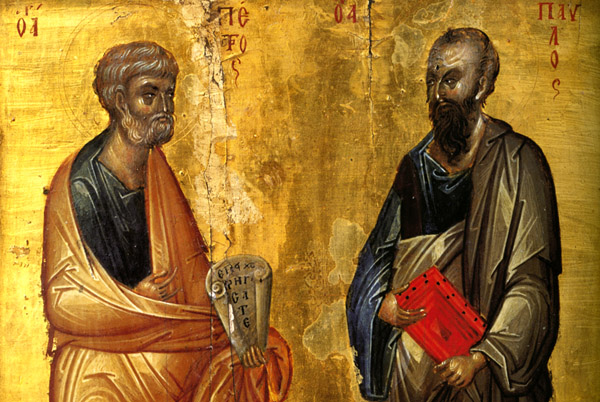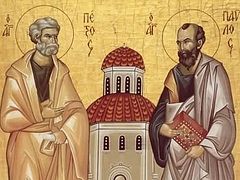
It would be hard to find two people more unlike each other. Peter was married (the Gospels mention his mother-in-law, and in the epistles is a word about his wife and travelling companion), while Paul was a virgin.
Peter knew Christ from the first days of the Savior’s service in society, while Paul only came to know Christ after His resurrection.
Further. Peter was a Galilean fisherman, while Paul was the disciple of great scholars and a Pharisee by upbringing. Both were Jews; however, Paul preached the word of God mainly to pagans, renewing them by the Spirit and forming with them the contents of the Church. Peter preached the Gospels mainly to the circumcised, that is, to those of his own race.
Peter was the oldest of all the close disciples, but Paul labored more than them all, although he said, “Not I, but God’s grace.” They also died in different ways.
As a Roman citizen, Paul was decapitated. Having hit the ground thrice, Paul’s head brought three springs to flow from the ground. This place is still called, “Three Fountains”. But Peter was crucified upside-down, his wife having been executed first. “Woman, remember the Lord!” Peter shouted to her and climbed on the cross, his feet pointing to the Church in heaven, where we all should go.
What do the differences between the two apostles, celebrated on the same, day tell us? They tell us that in the Church, everyone is different. And this difference is a true blessing, if there is oneness of faith and a unity of love. If for dictators “no one is irreplaceable,” then for God all are unique and all irreplaceable. The main thing is that there be common faith.
Thus, Peter and Paul, having labored in different ways in different parts of the world, came together in the end at Rome, where all roads led in those days. There they martyrically finished their labor and earthly path by a fearless death, confirming the truth of their preaching. Now they are truly together. They are together as inheritors of the Kingdom of God and rewarded with crowns; they are together as teachers of the Church, beloved by all who love the Lord Jesus.
* * *
One of the most important components of spiritual life is a change of name. A name is not a nickname, or a sound, but the very essence of a person, made verbally manifest. Before Abram became Abraham, he was Abram. God first found him, then tested him, and then changed his name with the addition of one more letter—which means extraordinarily much; and we do not speak of this more particularly only out of lack of space and time.
Moses also, dying on the border of the Promised Land, transferred his power and authority to his co-struggler Hosea. It was Hosea’s duty to lead the people to the Promised Land, but Moses first changed his name to Joshua.
Among other promises made in Revelations, Christ says that, to him that overcome He will give a white stone, and in the stone a new name written (Rev. 2:17). That is, those who are saved will be renamed in the Kingdom of God, similar to the way Christians are renamed at the monastic tonsure.
So, the celebrated Peter and Paul did not always bear these—generally known—names. Peter was Simon, and Paul was Saul. Christ renamed His disciples, seeing their future service and knowing their inner qualities. It was the same for the sons of Zebedee—James and John—who became the “sons of thunder.” Simon bar Jonah received the name, “a rock”—that is, Peter. This rock is the good preaching of Jesus as the Son of the Living God. On this confession does the Church stand and will stand to the end of time.
Paul means “small” (from the Latin “paulius”). As preacher of the Gospel to the pagans, it was appropriate for Paul to bear this name, so that the pagans’ ears would not be offended by an unfamiliar sound. The great Paul called himself small, because he considered himself the “off-scouring”, that is, an “outcast”. He considered himself to be a useless existence, because there was a time when he persecuted God’s Church. Isn’t it true that this renaming is significant? What does it teach us?
It unites into one two necessary things—firmness of faith and personal humility. In the name Peter is the firmness of a cliff against which any wave is dashed. In the name Paul is voluntary self-effacement, the cure against pride, which threatens every person with spiritual death.
Not without reason are Peter and Paul commemorated together. After all, a person does not need just one of these virtues but both of them. Firm faith without humility is fraught with failure and destruction. Humility without faith is useless self-blame. Here we have another lesson from a theme seemingly as unnoticeable as the new apostolic names.
* * *
We continue our discussion on Sts. Peter and Paul. Important dates have what is called a forefeast and an afterfeast; these are the days of preparation for the solemnities, and the days during we delight in the meaning of the passing feast. That is what we also do in speaking of the chief apostles three times—as if before the feast, on the feast, and after it has passed.
Every time we take Communion we repeat the apostles’ words. By the way! Let us not forget that we cannot receive Communion without first recalling Judas the betrayer, and the good thief! “Neither will I give Thee a kiss as did Judas, but like the thief will I confess Thee: remember me, O Lord, when Thou comest into Thy Kingdom.” That is how we pray before the Chalice. Apparently it is because every sinner is a thief before God, and the most terrible thing there can be in faith is betrayal. It would be better not to know Christ than having known Him to exchange Him for any other thing, no matter what that might be.
In this same prayer are the words of Sts. Peter and Paul. What was the main thing in what Peter said? The confession pronounced in Caesarea Philipi in answer to the question: “Who do men say that I am?” “Thou art the Christ, the Son of the Living God,” Peter answered, by God’s inspiration. We say these words before Communion: “I believe O Lord and I confess, that Thou are truly the Christ, Son of the Living God.”
And what did Paul say? Oh, he said a lot. But among it all is this: “Christ came into the world to save sinners, of whom and am the first.” We also repeat these words before the holy Chalice.
After Peter’s words, “Thou art the Christ, Son of the Living God,” we add, “Who came into the world to save sinners, of whom I am the first.” Thus, when receiving Communion we pray with the words of Peter and Paul, in which is a pure confession, on the one hand, and humble recognition of our sins on the other.
A little earlier we said that the very names of the apostles teach us firmness of faith and repentance. Peter is the rock, and Paul is voluntary self-diminishment. We said that a person must not only believe, but believe and humble himself. But not simply humble himself and wither from depression, but be humble and believe.
Precisely this combination of faith and humility is required before the Chalice. Here is maximum concentration of inner powers and mental attention of the heart! Here is true partaking of the power of apostolic faith! Here is essential kinship with Peter and Paul, with Andrew and James, with Thomas and Matthew. Not only with them! Here is unity with the Word Incarnate, Who both gives life and cleanses of every sin.
* * *
Thus, these are the three lessons from two apostles: 1) unity of faith in vibrant diversity, 2) union of steadfast faith with active humility, and 3) partaking of the apostolic spirit at the Holy Chalice. May we receive all this, through the prayers of the former Galilean fisherman, and the former disciple of Gamaliel.






